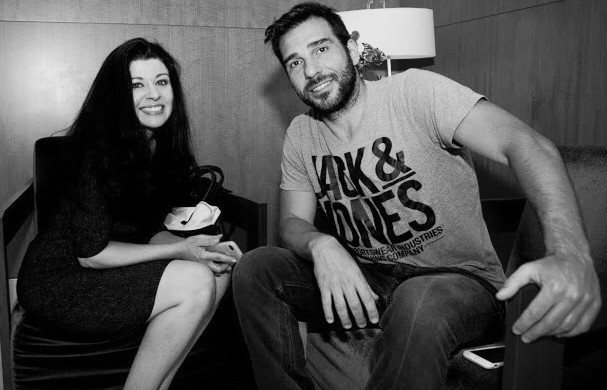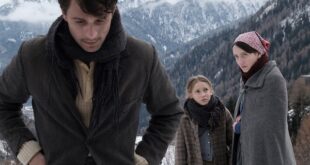
Basilicata is emerging as Italy’s Land of Cinema.
It’s a vast, spacious land untouched and unpolluted by industry. Its rolling hills, majestic mountains and ancient buildings have stood the test of time. Throughout the years, it has served as a backdrop for iconic filmmakers like Pier Paolo Pasolini and Francesco Rosi. Now, a whole new generation of filmmakers is discovering the magic of Basilicata as a natural set, bringing the region to the world’s stage once again.
Edoardo Leo’s award-winning film, “Noi e La Giulia,” is the latest high-profile film to be shot in Basilicata. Adapted from Fabio Bartolomei’s book, “Giulia 1300 e altri miracoli,” the story follows three unlikely partners as they join hands on the risky business venture of turning a dilapidated farmhouse into a modern agriturismo.
The opening scenes were shot in Rome, with the remainder of the film shot in the countryside of Pomarico, situated in the hills of Matera. The farmhouse in which most of the scenes took place is called Masseria San Felice. Built in the late 18th century, the property belonged to the Castellano family, which owned much of the land in the surrounding area.
Leo’s film was the first major production since the Lucana Film Commission was established, so its director, Paride Leporace, is absolutely thrilled. Leporace works tirelessly to promote the culture and filmmaking of his beloved Basilicata. He travels from south to north and everywhere in between with the region’s filmmakers to spread the word about their southern gem.
I recently caught up with Edoardo Leo at the Italian Contemporary Film Festival in Toronto where “Noi e La Giulia” was shown to a packed theater. When Basilicata was mentioned as its backdrop, there was applause and cheers as proud Lucani-Canadians celebrated their beautiful cinematic land. Leo and I talked about his experience working in Basilicata and why he plans on going back.
Fra Noi: There has been a huge surge in film production in Basilicata during the last year, with movies like “Ben Hur,” “007” and your film, “Noi e La Giulia.” Tell me about your experience there.
Edoardo Leo: It was a great experience. In “Noi e La Giulia,” I never mention Basilicata. I wanted to shoot a sort of symbol of the south of Italy, never mentioning Campania or Cammora or the Sicilian mafia. I just wanted to be in the heart of the south. Now in Basilicata, they have a great film commission so I was able to shoot with fantastic people in a fantastic place, so I am very happy.
FN: How did you find the farmhouse?
EL: We saw the farmhouse when we started to scout locations. Sometimes you can spend more than 20 days to find the perfect location. In this movie, we just used the one location and it was the first one I saw. It was a real miracle, but after seeing that farmhouse, we were all convinced that it was perfect. We said, let’s continue to look for something else but we were all convinced that that place was perfect for the movie. Basilicata is a great place and I would like to come back to shoot another film.
FN: What makes Basilicata such a great place to shoot a film?
EL: It’s quiet with great color and great light.
FN: Did you enjoy the culture and the food, in particular? We can’t talk about Basilicata without mentioning the amazing food and of course, Matera’s famous bread.
EL: (Laughs) Yes, the food in Basilicata is great, really great. Every night, we went to Matera to eat the fish and traditional food of the region.. and the bread, too. It all was great.
FN: What do you think of all the support for your film and the pride of the people of Basilicata?
EL: They are very active and they’re very proud of their region. When you talk about Italy, you always talk about the south of Italy, and you mention Sicily, Calabria or Puglia. But in the last three or four years, they really have made Basilicata shine, and they’re right. I think in the next 10 years, more tourists will come to Italy to visit Basilicata. That is what I dream for them.
Paride Leporace and his team are extremely prolific in their promotion of the region. They are very active on social media, always promoting the events in which they will attend to talk about the latest production and news of the region. Visit the Lucana Film Commission online at http://www.lucanafilmcommission.it. There, you will find links to follow them on social media.
Stay tuned for more posts about Basilicata: Terra di Cinema.
 Fra Noi Embrace Your Inner Italian
Fra Noi Embrace Your Inner Italian







Hello “John Harrison” so this is really you? And you actual name is Edoardo Leo….. wow I’m actually in shock now! I can’t believe with all we talked about that you can sit there act like this is not you but that you are this John Harrison!!!! Boy did I ever get fooled.!!!! God damnit I knew I should have listened to my boy. He kept telling me “mom he is not the actual person”!! Guess he may have been right this time. ‘